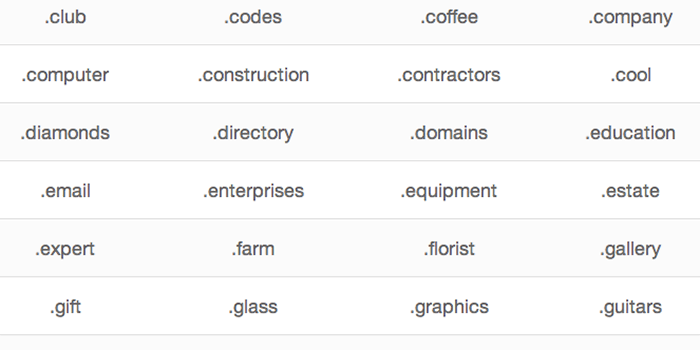New gTLDs – worth adding to your mix?
With the arrival on the market of a new tranche of gTLDs [ generic Top Level Domains ] to go alongside the classic .com, .co.uk etc, there’s one basic question interested parties will need answered? Should you bother handing over hard earned cash to licence one or more of them for your websites/organisations. Here are my thoughts:
Marketing Possibilities of a new gTLD
The main thrust of the marketing is that having a tld that more closely associates with your business sector, interest area or geographic location, you will stand out from the crowd ( so far, so obvious ). To get an understanding on how these aspects are being perceived by interested and involved businesses I recommend the Lucy Fisher piece on the BBC website. My thinking is that the benefits are not clear cut. How useful a marketing tool they will be for registrants remains open for considered thought debate.

A small selection of the newly available gTLDs
Some initial Considerations
Google and the new gTLDs
Google have already made clear that they will be treating the new TLDs as generic. That is to say they won’t have any influence or value in terms of the SEO aspect. As regards the geographical versions ( eg. .london ) they have stated that if there is sufficient uptake in the next year or two then they might consider treating those differently. However, I carried out a quick test to see if in the registration process ( in this case for a .london domain ) there were any checks to ensure that only businesses and organisations with genuine and legitimate connections to London could reserve one. There did not seem to be anything in place to ensure this*. That would seem to leave it open to anyone who simply hopes to benefit from the association. If there are a lot of spurious registrations, will that affect Google’s decision. It certainly should do.
In fact, adoption of one of the new strings as your main domain could actually have an adverse effect on your SEO score. As a very simple example, if you were already using somethinglondon.com as your prime domain and decided that acquiring and switching to using something.london was a better idea, realise that in the first case ‘London’ had an SEO input to your overall score ( because the main search engines take domain name ‘keywords’ into consideration ). In moving to the new domain you lose out as ‘London’ will now be classified simply as a generic term.
*it was a very limited test, simply going through the process at one registrar until I reached the checkout phase. Perhaps there is something in place at the payment stage but frankly, it seems unlikely to me that they would leave it until that late in the day.
A more complicated browsing experience
From a web visitor’s standpoint, if previously I didn’t know the exact TLD an organisation used for its website it wouldn’t take very long to try the likely suspects from the usual suspects until I found the correct one. With this vastly expanded range, finding the correct gTLD requires a lot more guesswork. Given this scenario, I think it will still be best to ‘go trad’ and stick to one of the oldies. In fact, in this scenario I am more likely to recommend purchasing one of the new releases only to prevent someone else getting it and using it to squat.
Other Marketing Options for
The possibilities for creating a very catchy domain name to push your brand is very enticing. Perhaps allied with a new microsite built for a specific campaign? I think this would be the perfect opportunity for a new gTLD to pay off. Splashed across banners and posters, a short, catchy domain certainly could be of benefit. This of course, has always been the case.

